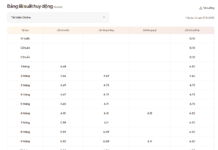
Lawyer Do Van Luan
|
Dear lawyer, can customers be criminally liable if they do not pay credit card debts?
A credit card allows the cardholder to make card transactions within the credit limit provided by the card issuer. The cardholder is granted loans within the credit limit specified in the card issuing agreement to spend in advance, and then repay the entire loan or make monthly installments to the credit institution. If the cardholder fails to repay the entire loan within the agreed timeframe stated in the contract, the cardholder will have to pay additional interest to the bank.
The cardholder who fails to repay credit card debts may be subject to the criminal liability of “Abuse of trust to appropriate property” as stipulated in Article 175 of the 2015 Penal Code, amended and supplemented by Clause 35 of Article 1 of the 2017 Penal Code, if there are sufficient signs to constitute a crime.
According to the law, does Eximbank correctly calculate interest continuously over 11 years when customers knew they had bad debts in 2017 and had ongoing communication with the bank?
The interest rate and calculation method are determined by the agreement between the two parties when opening the credit card.
According to Article 468, Civil Code 2015, the interest rate on loans is agreed upon by the parties, but must not exceed 20% per year, unless there are other relevant laws. However, the interest rate cap of 20% does not apply to the banking industry. According to Decision No. 1125 of the State Bank of Vietnam in 2023, banks are only allowed to agree on an interest rate of no more than 4% per year for priority areas such as agricultural and rural development, export business, business support for small enterprises, high-tech applications, or real estate purchase….
Therefore, the interest rate for consumer loans when using credit cards can reach any figure. In this case, the bank may have applied compounding interest, adding the interest amount to the principal for subsequent interest calculations on a monthly basis, so the amount from 8.5 million VND to 8.8 billion VND over 11 years is entirely possible if the overdue interest rate is around 70% per year.
The customer has asked the lawyer to intervene and file a lawsuit, what will be the course of action?
If the bank cannot negotiate with the customer on repaying the principal and interest, they must file a lawsuit against the customer to recover this amount.
According to Clause 3, Article 150, Civil Code 2015, the statute of limitations for filing a lawsuit “is the time limit for the subject to be entitled to file a lawsuit to request the court to settle civil cases protecting their rights and legitimate interests which have been infringed upon; if the time limit ends, the entitlement to file a lawsuit is lost”. However, the customer’s breach of payment obligation has lasted for 11 years, when filing a lawsuit, the bank may only be able to recover the principal amount of 8.5 million VND, and the amount of interest will have to be based on the agreement in the credit card contract to determine whether the statute of limitations has expired or not.
Because according to Article 2, Section 2, Article 155 of the Civil Code 2015, the statute of limitations does not apply in the case of “request for protection of ownership rights, except as otherwise provided by this Code or other relevant laws”, the claim for repayment of the principal is considered a request for protection of ownership rights, so the statute of limitations does not apply, and the claimant can file a lawsuit at any time.
As for the interest incurred from the loan agreement, it is considered a contract dispute. Up to now, when the bank filed a lawsuit to demand the customer to repay the interest, based on Article 429 of the Civil Code 2015, the statute of limitations for filing a lawsuit to request the court to settle a contract dispute is 3 years, from the date when the person entitled to claim knows or must know that their rights and legitimate interests have been infringed upon. Therefore, to determine the statute of limitations in this case, it is necessary to rely on the agreement in the credit card contract to determine the time when the bank knows or must know that its rights and legitimate interests have been infringed upon; if the time from that date until now has been more than 3 years, the statute of limitations has expired, except for the cases where the statute of limitations is restarted as provided in Clause 1, Article 157 of the Civil Code 2015 or falls into the cases where time is not counted towards the statute of limitations of civil cases as stipulated in Article 156 of the Civil Code 2015.
Thank you, lawyer.
|
“Article 157. Restarting the statute of limitations of civil cases in the following cases: a) The obligated party admits partially or entirely their obligation to the plaintiff; b) The obligated party acknowledges or fully performs a part of their obligation to the plaintiff; c) The parties have reached a voluntary settlement with each other.” “Article 156. Time not counted towards the statute of limitations of civil cases, time limit for demanding resolution of civil matters Time not counted towards the statute of limitations of civil cases, time limit for demanding resolution of civil matters is the period when one of the following events occurs: 1. Force majeure events or objective obstacles that make the subject entitled to file a lawsuit, the right to make a claim impossible to file, claim within the time limit. Force majeure events are objectively unpredictable and irreparable events even though all necessary and possible measures have been taken. Objective obstacles are obstacles caused by objective circumstances that make the person with civil rights and obligations unable to know about the infringement of their rights and legitimate interests or unable to perform their civil rights and obligations; 2. Lack of legal representation in the case where the entitled person entitled to file a lawsuit, the person entitled to make a claim is an individual who is a minor, legally incapacitated, has difficulties in perception, self-control or limited legal capacity; 3. The person entitled to file a lawsuit here is a minor, a person who has lost legal capacity, a person who has difficulty in perception, self-control, a person who has limited legal capacity and has no other representative to substitute in the following cases: a) The representative dies if an individual, ceases to exist if a legal entity; b) The representative, for legitimate reasons, can no longer continue to act as a representative.” |
Latest updates on the credit card debt of 8.5 million VND turning into 8.8 billion VND












